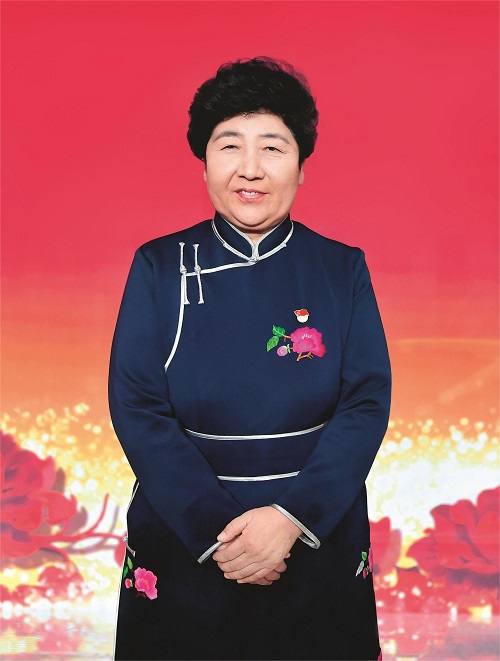Bai Jingying Embroidering Happy Life
 |
| Bai Jingying |
Ten people received the honorary title of "National Poverty-Alleviation Model" in Beijing on February 25. Bai Jingying was among the recipients. She has spared no effort in promoting the innovative development of Mongolia-style embroideries, and she has led 26,000 women in working in the Mongolia embroidery industry.
Bai is chairperson of the Standing Committee of Horqin Right Wing Middle Banner People's Congress and president of Mongolia Embroidery Association. She was born into a Mongolian family in Horqin Right Wing Middle Banner, in North China's Inner Mongolia Autonomous Region, in 1963. Both her mother and grandmother were good at making Mongolia embroideries.
"When I was a child, my clothes and shoes had beautiful, embroidered patterns. My mother also embroidered quilts and curtains. I often accompanied her to make embroideries at night, and I also learned how to embroider," Bai recalls.
After she grew up, she kept busy, with her work and studies, and, as a result, seldom had time to make embroideries. But she was always concerned about the development of Mongolia embroidery.
In recent years, since realizing Mongolia embroidery has been gradually disappearing from people's lives, Bai has grown increasingly worried about the future of the craft. She has often thought, "Mongolia embroidery, with exquisite patterns, bright colors and unique charm, should not be forgotten."
In 2016, with the support of the banner's Party (Communist Party of China) committee and government, Bai became president of Mongolia Embroidery Association and head of a special team responsible for promoting the Mongolia embroidery industry.
Aimed at fighting poverty by developing the embroidery industry, Bai established a college students' entrepreneurship, employment and poverty-alleviation service association, a poverty-alleviation embroidery company, and an embroidery base.
She also established China's largest Mongolia embroidery poverty-alleviation workshop, and she created a comprehensive and cooperative business model to boost the development of the Mongolia embroidery industry.
Bai has visited almost all of the villages in the banner, to teach embroidery skills to the locals. Since 2016, she and her team's members have trained more than 16,000 people. Many farmers and herdsmen in the banner have been lifted out of poverty by working in the Mongolia embroidery industry. The annual per capital income of 2,895 impoverished households has increased by at least 2,000 yuan (US $308) in recent years.
Bai has designed 1,072 embroidery products, and more than 7,000 embroidery patterns, which are given free to embroidery workers and college graduates returning to their hometowns for employment.
To expand the market, Bai has organized training seminars for sales and marketing personnel, and she has established 37 sales outlets across the country. The company's embroidery products have been exported to other countries.
Thanks to the efforts of Bai and women embroiderers, Horqin Right Wing Middle Banner has become known as the Hometown of Mongolia Embroidery in China.
Bai says she was excited when she accepted the medal and certificate of "National Poverty-Alleviation Model" from Chinese President Xi Jinping.
"The honor is the affirmation of and encouragement to continue the poverty-alleviation work of Horqin Right Wing Middle Banner. As a Party member, a deputy of the people and a poverty-alleviation cadre, I felt incomparably honored … I will keep working hard and play a bigger role during the process of rural revitalization," she says.
Photo Supplied by Fan Wenjun
(Women of China English Monthly March 2021 issue)
Please understand that womenofchina.cn,a non-profit, information-communication website, cannot reach every writer before using articles and images. For copyright issues, please contact us by emailing: website@womenofchina.cn. The articles published and opinions expressed on this website represent the opinions of writers and are not necessarily shared by womenofchina.cn.

 京公网安备 11010102004314号
京公网安备 11010102004314号